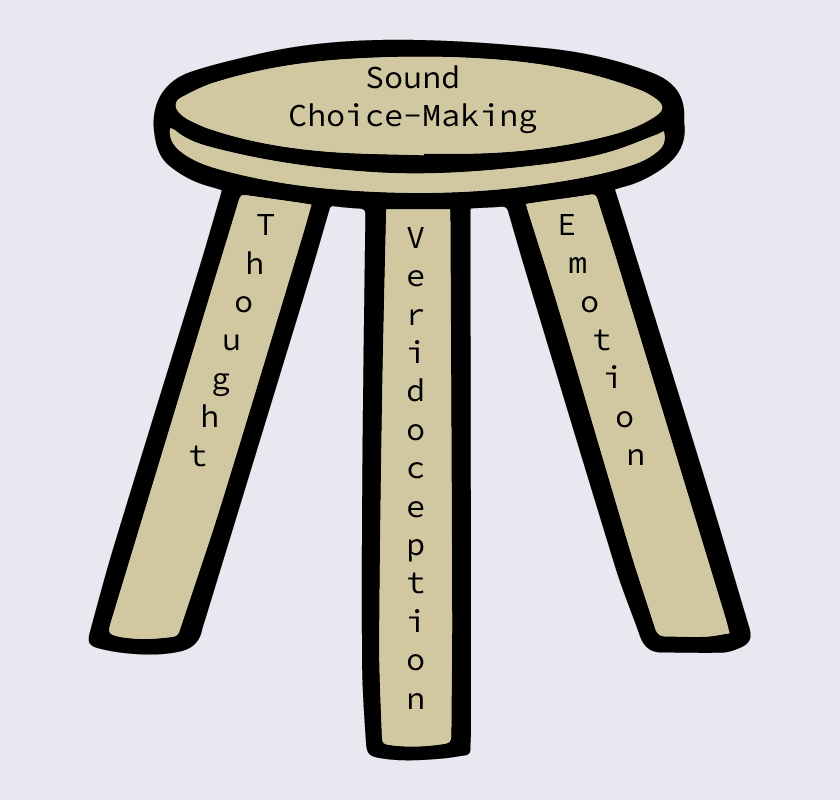SUMMARY: Veridoception, a word coined by our Director Dr. Kevin S. Millet, refers to our innate capacity to sense truth, right, universality, sustainability, resonance, and the like. It aligns with interoceptive reasoning. It is an understanding that emerges from within us when we are sufficiently clear of the interfering noise of symptoms, life stressors, and toxins. Incorporating veridoception into our choice-making process will increase our power, efficiency, and peace.
“Apart from the known [sense] organs, we also have other organs suited to receiving sensations; we do not suspect their existence because of the predominant habit which we have…of making use of the primary organs, and because the strong impressions…absorb the more subtle impressions and do not allow us to be aware of them.”
Franz A. Mesmer (1734-1815)

Veridoception is my most cherished personal capacity. Don’t get me wrong, I’m both a brainiac and emotionally sensitive person. Ultimately, however, it is the veridoceptive impulses that hold the most sway in my choice-making.
What is veridoception? It our innate capacity to sense inwardly sense the degree of truth, safety, right course, universal good, foresight, and the sustainability of a particular choice being contemplated. It is a knowing that emerges within us.
Unlike our thoughts and emotions, veridoception is quite subtle and our ability to notice it and recognize its contribution to our choice-making must be cultivated. While its input is constantly streaming into our minds its subtlety makes it at the mercy of possible intereference that can drown it out. These interferences are primarily our own thoughts and emotions however many others can make it nearly impossible to discern its impressions. These include physical symptoms (e.g. pain, fatigue, nausea), life stressors (e.g. deadlines, betrayal, “bad” news), and toxins (e.g. pharmaceuticals, recreational substances, environmental pollutants). Therefore,
Incorporating it into our choice-making process will increase our power, efficiency, and peace.
In spite of veridoception often being temporarily at the mercy of our thoughts and emotions it eventually has to be integrated and harmonized with them. Each capacity makes up on leg of a three-legged stool – If any one of them are missing our choice-making runs the risk of being short-sighted and laden with blind spots.
While veridoception is similar to what is referred to as our conscience or what a mentor of mine described a “felt moral imperative,” is goes beyond right and wrong into the field of resonant, peaceful, harmonious. Having been brought up in a religious home I was taught about conscience, a “still small voice.” However, its influences were limited to those of spiritual consequence, alerting me if a particular action or inaction would offend God and imperil my afterlife.
As I matured I realized that these subtle influences which were distinct from my thoughts and emotions offered a bounty of insights and clarifications.
General vs. Special Senses
Specialized senses are an extension of the generalized senses. Specialized senses serve as a compliment to the, rather than a replacement for, the generalized ones. Our generalized senses came first and present in all living things whereas specialized senses are only experienced in a small percentage of living things. Specialized senses include not only touch, taste, smell, sight, and hearing but also thought and emotion. Each of these exist in a generalized, or non-specific, form within the generalized sense apparatus. The specialized senses are portions of our sense apparatus which are highly focused, exaggerated sensors to up the volume and clarity of particular elements of the sense apparatus. As F.W.H. Meyers put it in his 1907 masterpiece Human Personality, “Man’s ocular vision is but a special or privileged case of visual power, of which power his inner vision affords a more extensive example.“
Specialization comes with drawbacks. Inherent in specialization is the loss of the big picture. Furthermore, the loudness or increased volume of the specialized senses can drown out the general senses altogether. The general senses are needed for context. Our specialized (outer) senses congeal into our thoughts and emotions while our generalized (inner) senses as veridoception.
As an analogy I ask that you look at the following image. What do you immediately see? Keep looking. Relax your eyes. Focus your mind on the center of the image. Tune out any distractions. Be patient. Keep looking. Now what do you see?

At first you likely saw the rail and the grass and nothing else. Yet in time, and likely with effort exerted to tune out distractions and remained focused, a more subtle image of a horse appeared.
I’d like to use this as an analogy of our senses. Our specialized senses offer data that is immediate and without effort but incomplete (only a split-rail fence and grass). A complete picture (a split-rail fence, grass, AND a horse) require tuning into something more subtle, more elusive, something that tests our patience to acquire.
This takes me back to the 3-legged stool analogy where 2 legs depend upon specialized senses (thought and emotion) and the 3rd upon our more subtle, generalized sense (veridoception). The “low-hanging fruit” of our specialized senses (thought & emotion) entice us to rely solely upon them to navigate our life. However, veridoception is required for a complete picture and requires us to reach high up to the top of the tree in order to glean this fruit.
Veridoception: A Pathway to Dignity
Veridoception, because it is in contact with “the big picture,” allows for the dignity of every human being and really, every form of life. Ultimately there is not competition between one person’s needs and anothers. It only appears that way when our stool only has two legs. It is within the realm of veridoception that every person’s needs remain valuable, important, and inclusive. No one person’s needs supersede another’s. Veridoception prevents us from making decisions at the expense of others. Veridoception promotes peace, collective abundance, and restores mutual dignity.
Cultivating Veridoception
Veridoception is only accessible and discernable to the degree that the body, mind, and heart are sound, clear, and open. This requires a committment to well-being, an avoidance of substances which cloud and distort, and a desire to be of service. Veridoception is an understanding that emerges from within us when we are sufficiently clear of the interfering noise of symptoms, life stressors, and toxins. This can be a lifelong process, indeed it has been and remains one for me.
That being said I have found that incorporating veridoception into my choice-making process has increased my personal power, inner peace, and compassion for others.
